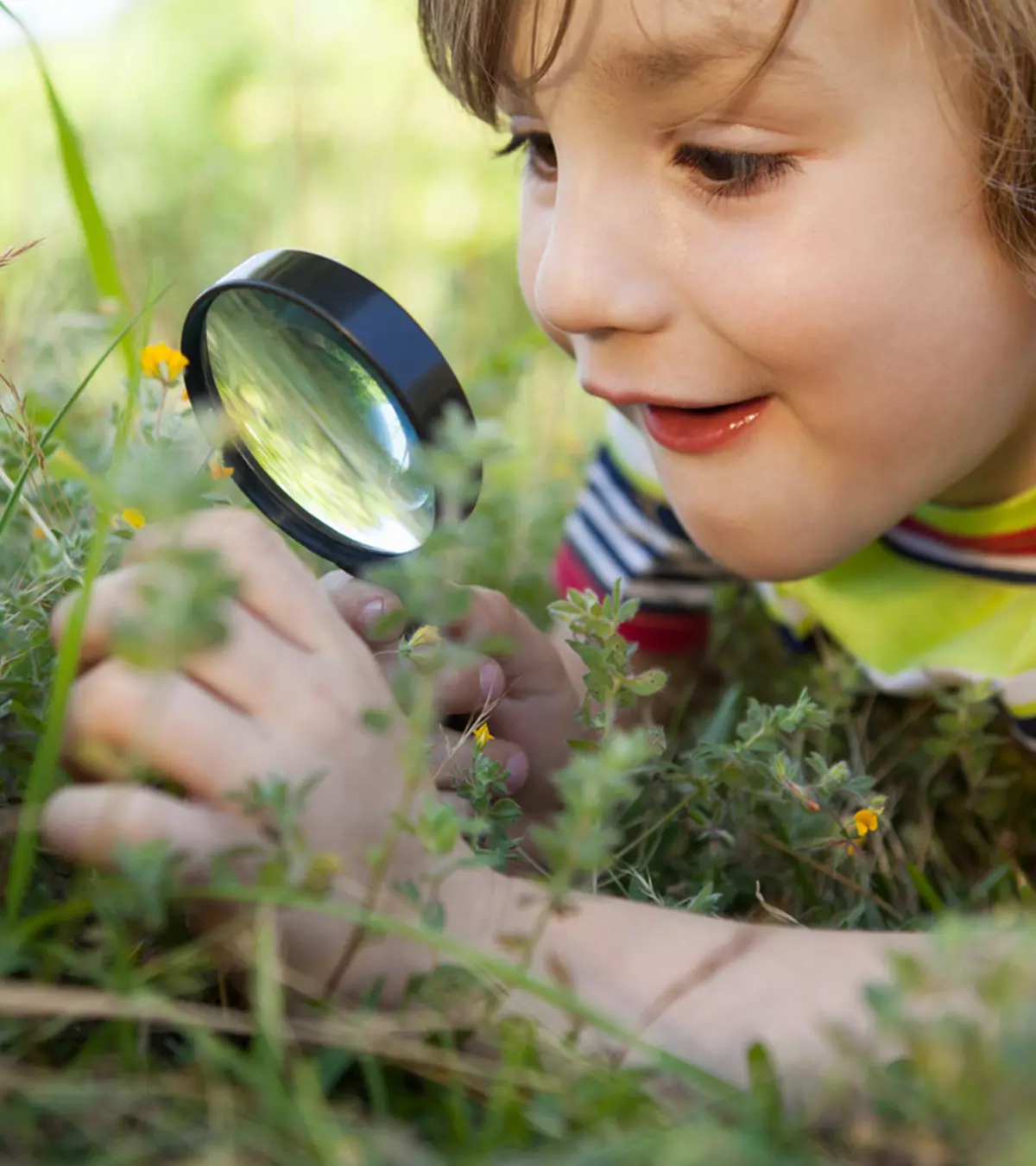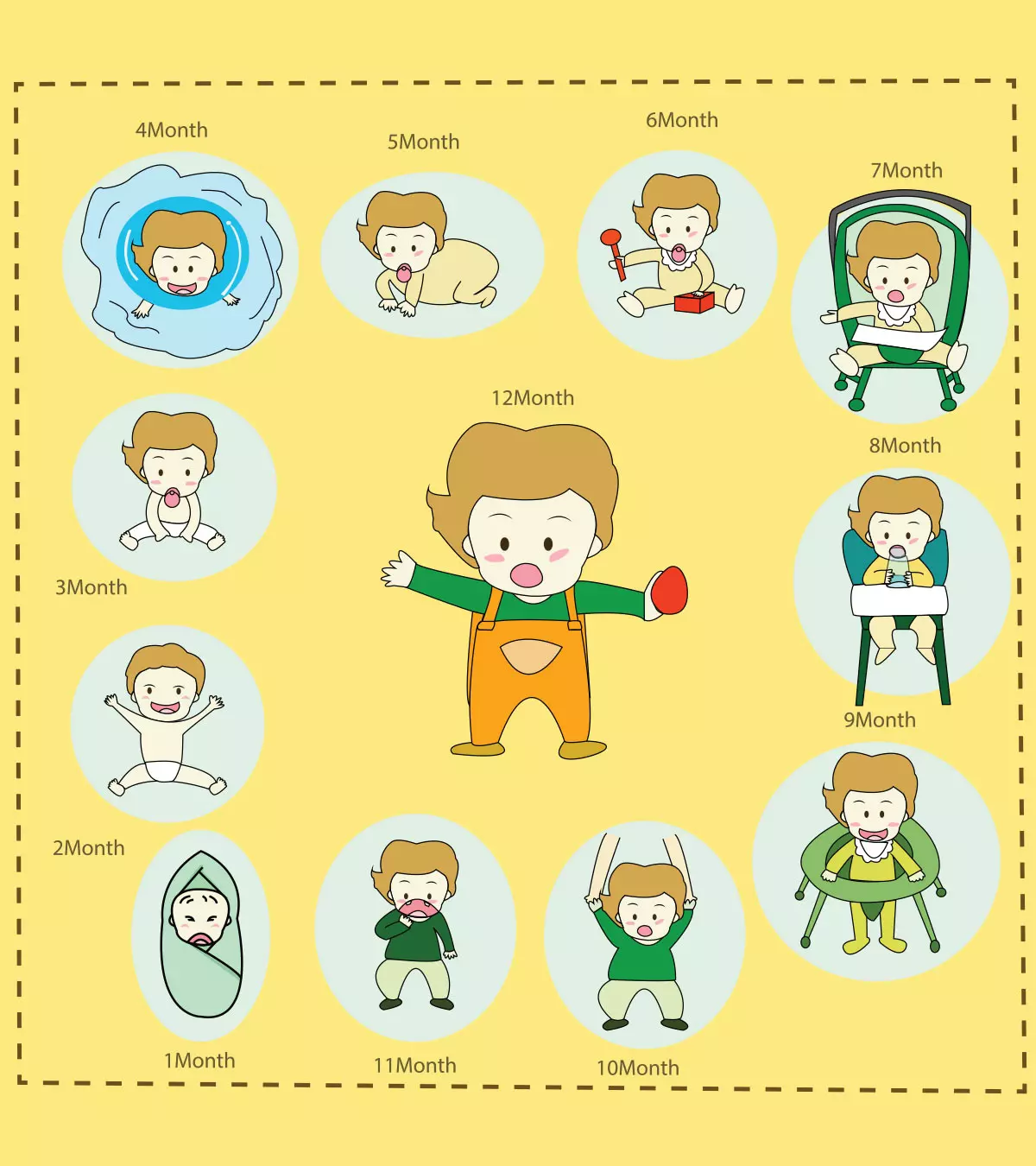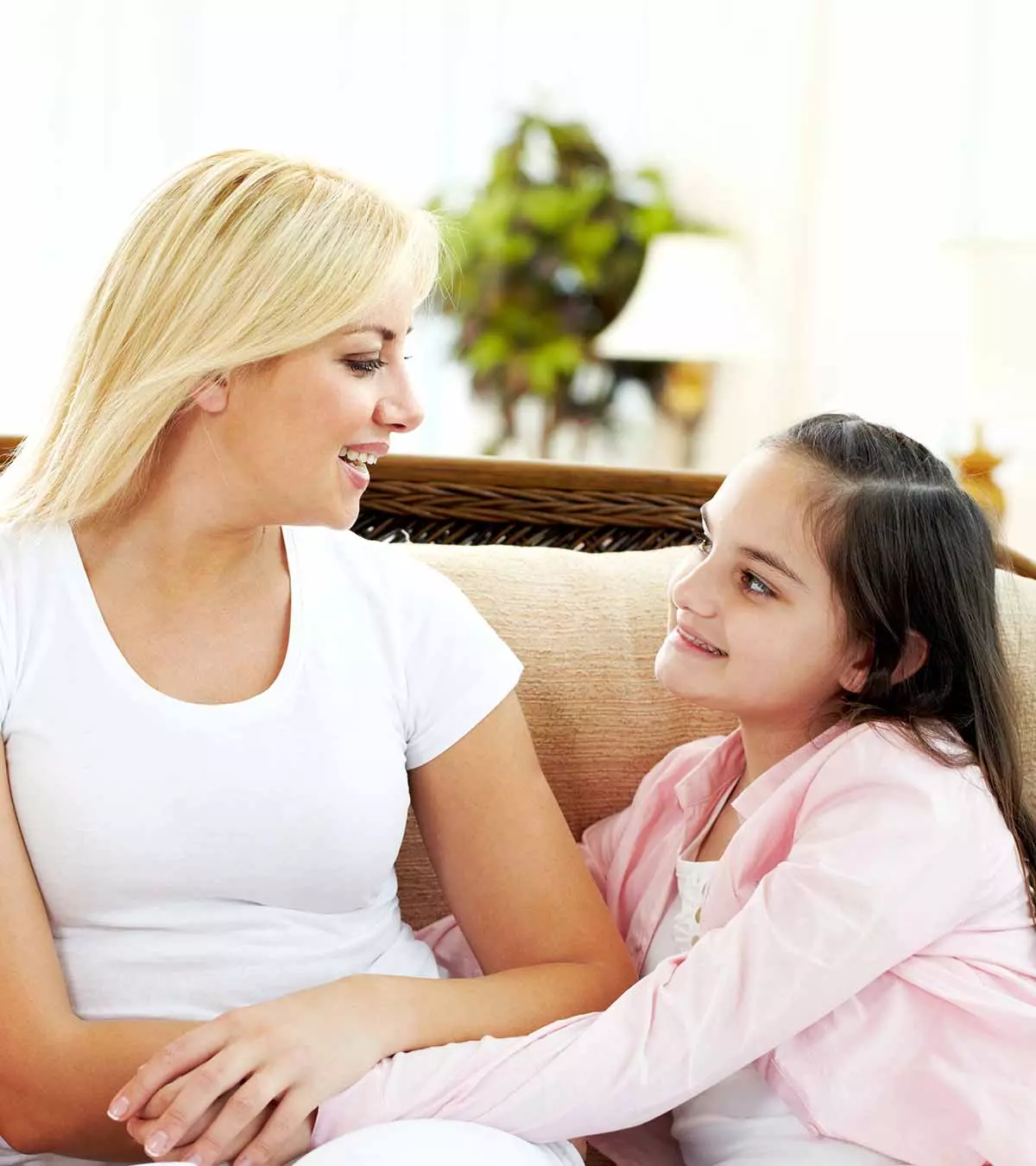
Image: ShutterStock
Moral development in children may be considered one of the central aspects of socialization. It is a process through which children learn to differentiate wrong from right based on society’s social and cultural laws and norms. Parents and teachers play an important role in teaching morals to children. Teaching morals at a young age can help raise responsible citizens. However, the understanding and implementation of moral values in children depend on the environment they are raised in and their physical, social, emotional, and cognitive skills. Read this post to learn more about the stages of moral development in children and tips on how parents can help their children learn moral values.
Key Pointers
- Children’s moral development progresses gradually from infancy through adolescence and beyond.
- Piaget’s theory, Kohlberg’s theory, Carol Gilligan’s theory, and Skinner’s theory all describe multiple stages of moral development in children.
- Parents can assist their children’s moral development by providing ongoing motivation, praise, acknowledgment, and modeling good behavior.
- Parents should also teach their children about good morals and how their actions can impact others around them.
- Group and educational games such as hide-n-seek, running races, and tic-tac-toe can aid in the development of moral skills in children.
Defining Morality
Morality is the ability to see the difference between right and wrong in intentions, thoughts, actions, and behavior. Teaching this concept to children is the primary goal of parenting. Moral development deals with the concepts of morality that a child learns from infancy through adulthood.
What Is Moral Development?
Moral development is the gradual process of understanding what is right and wrong, good and bad. It starts from infancy and continues till an individual is a mature adult. This process begins with basic ideas about right and wrong and grows more complex as we mature, resulting in a deeper understanding of moral principles and how they apply in different situations (1).
The Importance Of Moral Development in Children
Moral development in children is crucial as it shapes their understanding of right and wrong, cultivates empathy, and teaches them how to interact with others. Learning moral values as a child can help them develop a sense of fairness, honesty, and responsibility. It also helps children learn to care about the effect of their actions on others and think about the well-being and rights of those around them. Building a strong foundation for moral development in early childhood enables children to learn how to make good choices and behave better as they grow up.
Keep reading to learn about the different stages of moral development in children.
Stages Of Moral Development In Children
Moral growth in children happens gradually as they grow from infancy to teens and older. Let’s see that in detail:
1. Infants
Infants cannot moralize. Their sense of right and wrong depends on their feelings and desires. After being provided for nine months in the mother’s womb, a baby expects the nurturing to continue. As a result, their sense of rightness depends on whether or not their needs are met.
- Hunger and loneliness are uncomfortable feelings for your infant and do not feel right.
- Being attended, cuddled, and fed feels right, while unresponsiveness is scary and wrong.
2. Toddlers
Age:
2 to 3 years
At this age, your toddler realizes that others have rights and needs as well. However, he is yet to grasp the difference between right and wrong. A toddler aged 2-3 might show empathy-based guilt and moral behaviors. Depending on the actions conveyed by parents, the toddler understands obedience is the norm.
- Your toddler knows that it is wrong to take away a toy from a sibling only because he might land himself in trouble.
- While he may not understand why hitting someone is wrong, he knows that he will be punished for doing that.
- Your toddler tends to follow the rules to avoid punishment.
 Point to consider
Point to consider3. Preschoolers
Age:
3 to 5 years
This is the age when your child internalizes family values.
- Since rules and norms are essential for discipline in the family, they become important for your child too.
- Your child expects older people, or parents, to take charge.
- They understand the role of a “child” and an “adult” and expect maturity to be directed towards them.
- The child recognizes that actions have consequences – “If I do this, this will happen.”
- Positive parental direction makes the child connected, and he behaves well. The unconnected child will do what he feels like, unless and until he doesn’t get caught.
4. Kids

Image: IStock
Age: 7-10
After the age of 7, children start questioning if the people who hold authoritative positions, such as teachers and parents, are infallible.
- Your child will develop a strong sense of what he should and should not do. They would want to participate in making rules.
- Children of this age develop a sense of fairness and understand the necessity of rules.
- They understand children have rights as well and they filter rules according to what suits them.
5. Teens
As they get closer to adulthood, children develop their own integrity, moral values, character, and self-awareness while questioning and analyzing the ones their parents set for them.
Age: 11-16
- Your adolescent will expand his moral horizon and see rules as a set of social guidelines that benefit all.
- They value rules but also negotiate.
- They become interested in what’s good for society as they develop abstract decision-making and reasoning abilities.
- Your adolescent will start realizing that the decision he takes affects others around him.
- Your teen will want to be accepted by peers and may alter or change his values and morals that further that cause.
- The cycle goes from “I do this because I find it right” to “I do this because my family does it” to finally- “I do this because this is right.”
 Quick fact
Quick factMoral development is not as simple as teaching values to children. It is so complicated that psychologists have come up with theories on them.
Piaget’s Theory Of Moral Development
According to Jean Piaget, a psychologist whose primary work was in child cognitive developmentiThe growth of a child’s ability to use knowledge through reasoning and thinking. states that children go through two major stages of moral judgment
He called the first stage, up to seven years of age, HeteronomyiThe state of one’s thoughts, actions, and definitions being influenced by other individuals. , where there is a morality constraint. After seven years, the stage of Autonomy sets in gradually.
Piaget has observed that a child’s moral development depends on his cognitive skills, and hence divided the process into the following stages:
Sensorimotor stage: Birth to 2 years
- The child understands the world in accordance to his motor development
- He coordinates experiences through physical interaction such as seeing, sucking, and grasping
- The child develops ‘object permanence’ where he understands that an object exists even when it cannot be seen, touched, or heard
Preoperational stage:
2 to 7 years
- The child lacks the ability to decenter, meaning that all his actions are driven by the understanding that he should be provided for
- Logically inadequate for mental operations
- The child’s thinking is egocentric, meaning he cannot understand others’ viewpoint
In the above two stages, the child is still not capable of distinguishing between what belongs to him and what belongs to the others. Hence, he wants everything for himself and is fussy about it.
Concrete Operational stage: 7 to 11 years

Image: IStock
- Does not have the ability of abstract reasoning
- During this process, the child’s mental representation increases extraordinarily
- Rapid acquisition of language due to cognitive symbolic development
- Elimination of egocentrismiThe inability to comprehend that others’ thinking and views can be different from ours.
Formal Operations stage:
11-12 years
- The child begins to reason abstractly
- Physical representation and mental representation
In the operational stages, the child is able to see things from a third person’s perspective. He understands the importance of cooperation, reciprocity and equality. This is when he transforms from Heteronomy to Autonomy.
Kohlberg’s Theory Of Moral Development
Lawrence Kohlberg, a Harvard professor of psychology, has propounded an ethical development theory with the below stages (4)(5):
- Stage 1: Punishment-obedience orientation: Young children behave righteously because they fear authority and follow the rules to avoid punishment.
- Stage 2: Egoism/individualism: The right action is that which satisfies one’s own needs and sometimes those of others. Reciprocity at this stage is not about loyalty or justice.
- Stage 3: Good boy/nice girl: The right action is that which pleases and impresses others. The individual is concerned about the impression he leaves on others, and seeks others’ approval with his good behavior.
- Stage 4: Law and order orientation: The right behavior means doing one’s duty, obedience to social norms for its own sake, and respect for authority.
- Stage 5: Social contract orientation: The child recognizes universal principles, individual and basic rights, and societal norms. Aside from what is agreed upon as correct, right action is also about personal values and opinions.
- Stage 6: Universal ethical principle orientation: The right action is decided by the individual’s conscience in accordance with self-chosen ethical principles.
Kohlberg termed stages 1 and 2 as pre-conventional morality, stages 3 and 4 as conventional morality, and the last two stages as post-conventional morality.
Carol Gilligan’s Theory Of Moral Development
Gilligan, a student of Kohlberg, has observed that Kohlberg’s study was based only on boys and men. She had said that women and men differ in their moral and psychological tendencies. Whereas men think in terms of rules and justice, women consider caring and relationships (6). So, she came out with her own set of stages:
- At the pre-conventional stage, the child’s aim is individual survival
- Then she acquires a sense of responsibility for others
- At the conventional stage, the individual is fine with self-sacrifice
- Then she realizes that she is a person too, and hence the transition from being good to truth
- At the post-conventional, she understands she does not hurt herself or anyone else.
Skinner’s Theory Of Moral Development
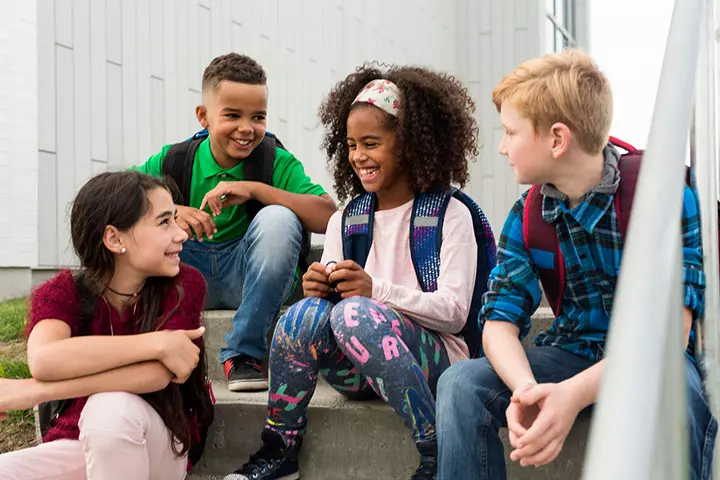
Image: IStock
Skinner’s theory is based on behaviorism (7):
- The outside world is crucial in shaping a child’s inner sense of morality.
- Socializing is a key attribute of moral development in children.
Albert Bandura’s Theory Of Moral Development
It centers on observational learning, wherein individuals acquire moral behaviors by observing others (8). Unlike theories that emphasize innate morality or abstract reasoning, Bandura’s approach highlights the influence of social interactions and environments. He asserts that moral development is a continuous process influenced by various social factors. Bandura further describes that individuals learn and develop their morality in four different stages.
- Observational learning: Individuals learn moral behaviors by watching and imitating others, especially authority figures or peers.
- Self-regulation: People develop internal standards of right and wrong, guiding their actions and decisions.
- Moral reasoning: This stage involves evaluating situations and decisions based on societal norms and personal ethics.
- Reinforcement and punishment: Consequences of actions play a significant role in shaping future moral choices.
 Did you know?
Did you know?Freud’s Concept Of Moral Development
Freud, who founded the field of psychoanalysis, believed that there’s often a conflict between what society expects and what an individual wants (9).
- Freud’s concept of moral development emerged from his theory of personality, which includes the id, ego, and superego.
- Moral development happens when people learn to control their selfish desires and instead follow the values of important socializing agents, such as parents.
There have been several theories on moral development. The crux is a child’s parents and the environment in which they grow up affect their sense of morality.
Parents’ Role In Moral Development Of Children
Children learn morality from the people they are closest to. Therefore, this is what you can do:
- Motivate your child to act within the acceptable norms.
- Identifying and acknowledging the emotions in the early stages will help your child know you empathize with them.
- Praise your child whenever they act positively and demonstrate morally correct behavior. This will help them know what is expected of them. Praise and appreciation will not only help in the moral development of your child but also motivate them.
- Your children look up to you and follow you closely. So, practice what you preach and be the role model they need you to be. For example, to prevent your children from lying, be a good example of honesty for them to follow.

Image: IStock
In addition to being a role model and encouraging, you need to teach them tolerance, forgiveness, resilience, integrity, humility, and generosity.
Teaching Moral Values To Children
It is not easy to make children understand and internalize the moral values you teach them is not practical. Here are some tips to do that (10):
- Explain the morals that you think are of utmost importance.
- Teach your child how misbehavior affects others and how it might affect him too. For example: “If you are lying, one day no one will believe you.”
- Talk to your child about hypothetical situations where they will have to indulge in the assessment of their thoughts, critical thinking, and decision-making. Let’s say, “Your friend is getting bullied, what would you do?”
- Teach that good morals have good consequences.
- Make sure that you, as a parent, keep your commitments and promises, and show kindness to your child.
- Be an example yourself or your child is likely to get confused.
Shuxin Lim, a writer and traveler, reflects on how moral stories such as The Tortoise and the Hare and The Boy Who Cried Wolf have shaped and taught her important life lessons. Emphasizing the importance of moral stories for kids of all ages, she says, “It’s easy to think that bedtime stories are for kids. It’s weird for a 15 y/o to head over to their parent’s room and ask for storytime. After spending the summer with my 4 y/o niece and reading many bedtime stories, I love how it teaches life lessons in such simple language (i).”
 Quick fact
Quick fact- Make your child take up some moral development activities.
Moral Development Activities
You may encourage your child through several individual, group, and educational activities to bring out the best in them. Games can teach children about social skills, teamwork, cooperation, self-control, self-discipline, and equality.
- Group games, such as hide-n-seek, running races, and aiming games, encourage children to understand the importance of rules and fair play.
- Through group games, children can learn that rules are ethical, and they should follow them not to avoid punishment, but because they are right.
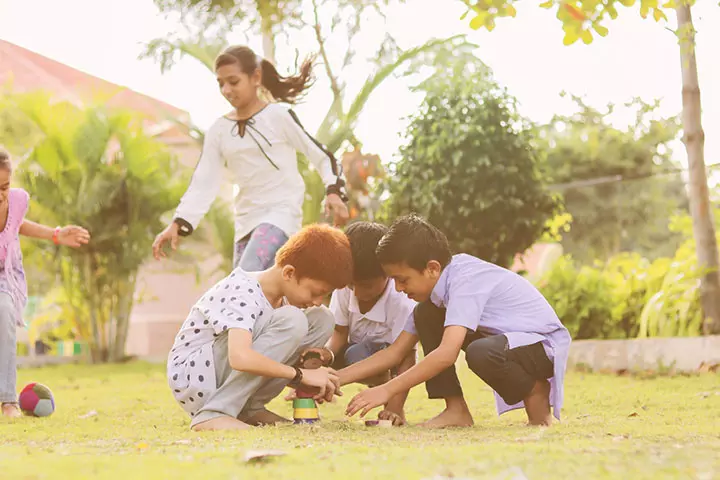
Image: IStock
- A game of tic-tac-toe is yet another excellent game for children, especially for infants and toddlers. Participate in the game to show that you are not an authoritative figure. This game helps children learn that some decisions and actions are in their hands and not everything they do is imposed by someone.
Frequently Asked Questions
1. What are the benefits of developing moral behavior in children?
Moral behaviors in children are essential as they teach them to develop positive traits such as kindness and compassion. In addition, it teaches them to distinguish right from wrong. Also, it helps them develop empathy for others and builds their self-esteem.
2. How does a child’s environment affect their moral development?
The environment that children grow up in, including their family and preschool, impacts their moral behavior. A pleasant and healthy environment will instill good habits and positive traits in children, and in the same way, unhealthy environments at home may negatively impact the child’s behavior.
3. What are the potential risks of not developing moral behavior in children?
The risk of not developing moral behavior in children includes a lack of value for self and others, indiscipline, difficulty forming social connections, and engaging in unhealthy behaviors.
4. What role do schools play in moral development?
Since children spend most of their time learning in schools, they play a major role in the moral development of children. Teachers can act as role models for children to emulate values, like honesty, fairness, and kindness. They can teach children to differentiate between right and wrong, respect others, and take responsibility. Moreover, children get to learn about different cultures and perspectives, which helps build their appreciation and respect for them. Overall, schools help shape students’ character and prepare them to be good, responsible members of society.
5. What are some common challenges in moral development?
Peer pressure is one of the most common challenges a child faces during the process of moral development. It can make it challenging for someone to stick to what they believe is right, especially when friends push them to act differently. Media can also influence an individual into believing negative behavior is cool, which can be confusing for children. Lacking a good role model at home, school, or anywhere else can make learning good behavior difficult. Lastly, difficult experiences can also affect one’s sense of right and wrong.
6. How do group activities contribute to moral development?
Group activities help foster cooperation and empathy. When children engage in team-based tasks, they learn to share, listen, and respect others’ opinions. These activities also teach them to make fair decisions, resolve conflicts amicably, practice patience, and understand the value of supporting one another.
Moral development in children is reflected in their personality and behaviors as adults. By instilling moral values early on, we shape children’s present behaviors and prepare them to become responsible, kind, and just individuals. Try some activities, educate them with important life lessons, teach them good manners for kids, and be an example yourself so that they learn and understand the value of having morals in life. Although it may not be as effortless as it sounds, starting early can give you time to take things slow and steady.
Infographic: Parents’ Role In The Moral Development Of Children
Parenting and the environment at home and school play a significant role in shaping their personality. So, it’s important for parents to teach morals to children from a young age. So, check out the infographic below on how to teach these values. Don’t forget to save it! Illustration: Momjunction Design Team
Illustration: Moral Development In Children: Ways To Teach And Activities
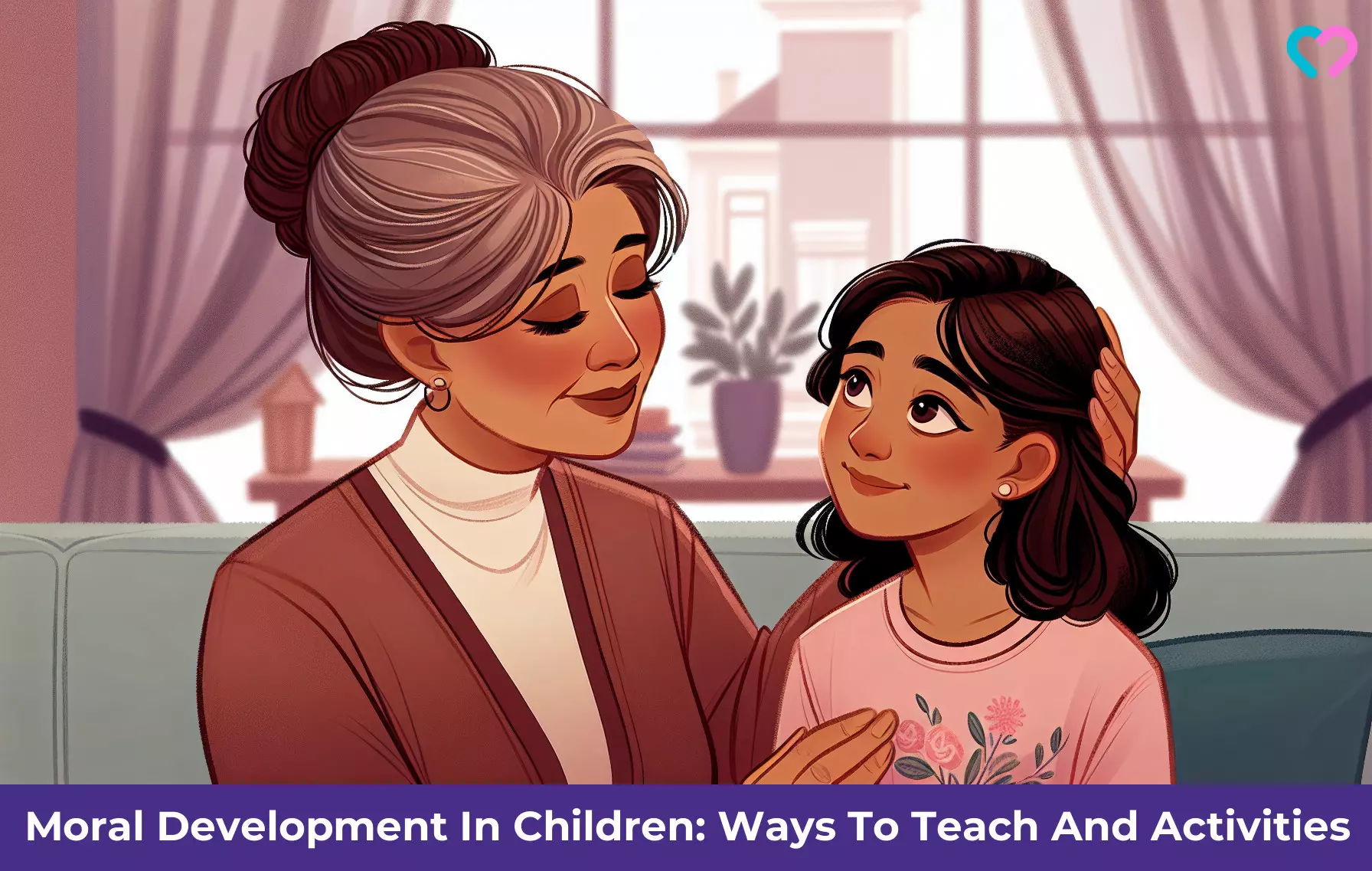
Image: Dall·E/MomJunction Design Team
Uncover Kohlberg’s 6 moral development stages. These stages are known for molding our ethical choices. Explore their role in enhancing decision-making. Delve into how these stages empower wiser selections, shaping a more principled path.
Personal Experience: Source
MomJunction articles include first-hand experiences to provide you with better insights through real-life narratives. Here are the sources of personal accounts referenced in this article.
i. 7 Short Moral Stories that Changed My Life.https://medium.com/the-post-grad-survival-guide/7-short-moral-stories-that-changed-my-life-162d91db7260
References
- Stefanie Dorough; (2011); Moral Development. Goldstein, S., Naglieri, J.A. (eds) Encyclopedia of Child Behavior and Development.
https://idp.springer.com/authorize?response_type=cookie&client_id=springerlink&redirect_uri=https%3A%2F%2Flink.springer.com%2Freferenceworkentry%2F10.1007%2F978-0-387-79061-9_1831 - Cognitive Development: Piaget.
https://www.trentu.ca/faculty/nim-bolter/cdoshawa/281H_2006FA_OSH_L4_6Slides.pdf - Hing Keung Ma; (2013); The Moral Development of the Child: An Integrated Model.
https://www.ncbi.nlm.nih.gov/pmc/articles/PMC3860007/ - Kohlberg’s State Model Of Moral Development
https://socialsci.libretexts.org/Bookshelves/Psychology/Introductory_Psychology/General_Psychology_for_Honors_Students_(Votaw)/28%3A_Theories_of_Development/28.02%3A_Kohlberg’s_State_Model_Of_Moral_Development - Kohlberg’s Stages of Moral Development
https://socialsci.libretexts.org/Bookshelves/Psychology/Developmental_Psychology/Lifespan_Development_-_A_Psychological_Perspective_2e_(Lally_and_Valentine-French)/05%3A_Middle_and_Late_Childhood/5.12%3A_Kohlbergs_Stages_of_Moral_Development
- Zekeriya ÇAMa et al.; (2012) Classical and Contemporary Approaches for Moral Development.
https://files.eric.ed.gov/fulltext/EJ987841.pdf - Educational Learning Theories: 2nd Edition.
https://oer.galileo.usg.edu/cgi/viewcontent.cgi?article=1000&context=education-textbooks - How Social Learning Theory Works.
https://hr.berkeley.edu/grow/grow-your-community/wisdom-caf%C3%A9-wednesday/how-social-learning-theory-works - Cameron Richardson et al.; (2018); Moral Development.
https://www.oxfordbibliographies.com/display/document/obo-9780199828340/obo-9780199828340-0091.xml - Values Matter: Using Your Values To Raise Caring Responsible Resilient Children.
https://centerforparentingeducation.org/library-of-articles/indulgence-values/values-matter-using-your-values-to-raise-caring-responsible-resilient-children-what-are-values/#what-to-do - Reinforcement And Punishment.
https://pressbooks.online.ucf.edu/lumenpsychology/chapter/operant-conditioning/ - Moral Education in Schools of Japan.
https://eric.ed.gov/?id=ED264154 - Altin et al.; (2011); Gender difference in perceiving aggression using the Bobo doll studies.
https://scholar.utc.edu/cgi/viewcontent.cgi?article=1183&context=mps
Community Experiences
Join the conversation and become a part of our nurturing community! Share your stories, experiences, and insights to connect with fellow parents.
Read full bio of Dr. Wayne Hough
Read full bio of Sagari Gongala
Read full bio of Harshita Makvana
Read full bio of Apoorva K







